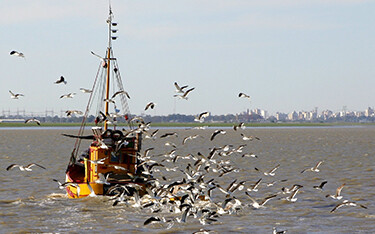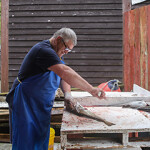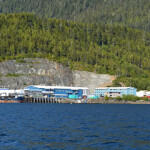MDA Ltd. announced at the 2022 UN Ocean Conference it’s providing the Global Fishing Watch (GFW) access to the company’s RADARSAT-2 satellite radar archive to effectively combat illegal, unreported, and unregulated (IUU) fishing activities. This archive represents 14 years of historical record of the Earth, with more than 970,000 images that include over 26 billion square kilometers of oceanic synthetic aperture radar (SAR) data.
The
… Read MoreThe Argentine red shrimp fishery has moved closer to Marine Stewardship Council certification with
The country's institute of fisheries, INIDEP, has developed a limit reference point for shrimp stock – a point at which fishing is no longer considered sustainable. Below that point there is a higher probability the stock is impaired and will not be able to replenish itself. The move is a requirement for MSC certification.
In
… Read MoreRare Foods Australia (RFA) has been awarded Marine Stewardship Council certification for its wild enhanced greenlip abalone fishery.
The certification makes it the first greenlip abalone fishery to be certified worldwide, and the twelfth Western Australian fishery to gain MSC certification. RFA is also the second enhanced fishery in Western Australia to gain MSC certification, alongside the silver-lipped pearl oyster fishery.
"World
… Read MoreFive companies – Bay Hill Seafood Sales, Corporacion Pesquera del Itsmo SA (CORPEISA – Alfa Gamma Group), Panalang Group, Tasty Seafood, Bajamar Seafood, have announced the relaunch of the Panama mahi and tuna longline fishery improvement project (FIP).
The relaunch of the FIP, in coordination with the Center for Development and Sustainable Fisheries (CeDePesca) – hopes to continue the progress achieved by
… Read MoreThe first production site of the Mauritanian small pelagic fishery and an Indian sardine oil fishery improvement project have had their first facilities accepted into the MarinTrust Improver Program.
The MarinTrust certification program, formerly known as IFFO RS, is a global marine ingredient standard for responsible supply, with requirements based on the FAO Code of Conduct for Responsible Fisheries. These include
… Read MoreRegional fisheries management organizations (RFMOs) play an important, though sometimes opaque, role in fisheries management and governance. These international organizations control fishing quotas and adopt and manage protective measures in geographical areas of the ocean or for specific species.
This article is the last in a four-part series covering the role regional fisheries management organizations in the global seafood trade. The series
… Read MoreRegional fisheries management organizations (RFMOs) play an important, though sometimes opaque, role in fisheries management and governance. These international organizations control fishing quotas and adopt and manage protective measures in geographical areas of the ocean or for specific species.
This article is the third in a four-part series covering the role regional fisheries management organizations in the global seafood trade. The series
… Read MoreRegional fisheries management organizations (RFMOs) play an important, though sometimes opaque, role in fisheries management and governance. These organizations are formed by countries that have fishing interests in those areas or stocks.
This article is the second in a four-part series covering the role regional fisheries management organizations in the global seafood trade. The series is intended to help seafood companies better understand the
… Read MoreRegional fisheries management organizations (RFMOs) play an important, though sometimes opaque, role in fisheries management and governance. In the last few years, with the help of pre-competitive collaborations like the Global Tuna Alliance (GTA), supply chain companies have become more engaged in RFMO management issues to the benefit of the entire industry.
The first in a four-part series covering the role regional fisheries management
… Read MoreA new, accredited third-party certification program, Fairness, Integrity, Safety, and Health (FISH) Standard for Crew, has announced three fishing fleets have become the first organizations to complete the FISH standard audits.
NovaNam (Pty) Ltd., a Namibian-based subsidiary of Nueva Pescanova Group; the At-Sea Processors Association (APA), representing the U.S. flagged Alaskan pollock catcher-processors; and Papua New
… Read More














